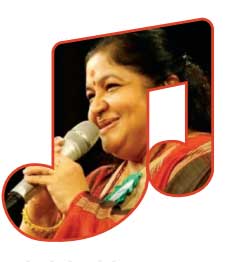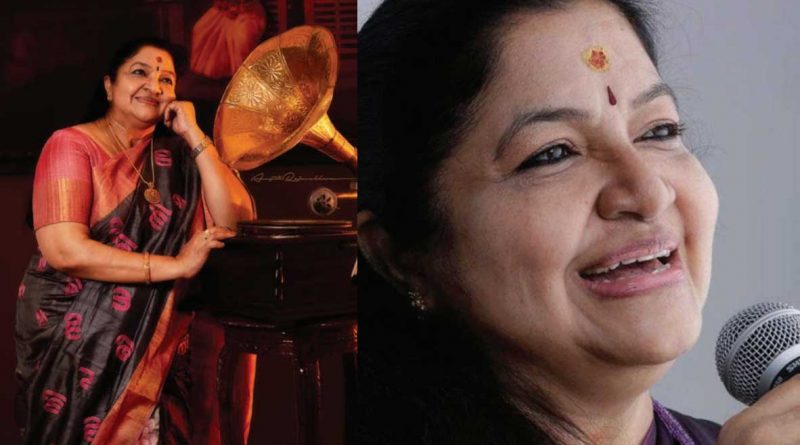A singer like a member of our family : K.S. Chitra

Many of the Malayalam films that came out in the 1990s attempted to capture rural lifestyles and cultures that were fast disappearing from view. Temples, festivals, customs and rituals and the joint family system became part of the narrative scheme of such films. As a natural outcome, what the songs in these films tried to capture were nostalgic memories of rural life and culture. And the voice that was most suited to rendering them effectively was K. S. Chitra’s. A majority of the songs of that period were about a house in the countryside, its surroundings, and its ecosystems. The repetition of words like wind, breeze, fragrant air, gentle wind, soft whiff, butterfly, parrot, courtyard, rain, sweet parrot, branch, mango tree, flower, sparrow, jasmine, turmeric, vermillion, perfumed sandal paste, moon, star, cloud, illam, field and so on in those songs are proof of that phenomenon. “Thaimanikunjuthennal,” “Shivamallippopozhikkummargazhikatte,” “Chellatathepaadaanvaa,” “Aadi thodiyiletho,” “Akuthikuthaadaanvaayo,” “Cheerapoovukalkummakodukkunna,” “Maarikkudilininullil,” “Thumpappookodiyuduthu,” “Chempakamettileentemulamkudilil,” “Choolamadichukaranginadakkum,” “Athipazhathil ilaneerchurthum,” “Mazhavilkothumbilerivanna,” “Ammummakkilivaayaadi,”“Olachangaali,” “Thumpayum thulasiyum,” “Thaaramvaalkannadinokki,” “Thaimaavinthanalil,” “Njaattuvelakiliye,” “Kunnathekonnaykkum,” “Ponmothiram,” and other songs that Chitra sang during that period were nostalgic picturizations of a house and the surrounding ecosystems. They were reminders of the bounties of Nature that were vanishing quickly from our daily life.
They generated in the hearts of listeners an impression that they were listening to the voice of a neighbour, and inspired a feeling of affection towards the singer. It even felt like the voice of an elder sister or a younger aunt. The songs caressed us like the fragrant breeze flowing gently from our courtyard or terrace. If we listen to Chitra’s sad melodies, we realize that her intonation, rendered as though she were uttering a holy mantra, and the soft and low pitch of the voice are the factors that have made them immortal. They bring the heart of the listener close to the heart of the singer. As her strains like “Thaanepoliyumkaithiri pole,” “Swaram swayammarannuvoshaarike,” “Aalmaramchaayumneram,” “Sindoorasandhyeparayu,” “Kilivaathilinkaathorthunjaan,” “Chaayampoyasandhyayil,” “Orunoorujanmampiraviyeduthaalum,” “Marakkumoneeyentemaunagaanam,” and “Vaarthingaludikkaathavaasantharaathriyil,” fall on our ears, we unknowingly dissolve into the emotional ambience they create. In a similar way, her voice is so special that when she sings in group songs like “Aayiramkannumai,” “Kiliyekiliyenaruthenmozhiye,” “Baggy jeansumshoesumaninju,” “Choolamadichukaranginadakkum,” “Nellikkadchuttinaaduchuttivaa,” “Thalayodutharitharivala,” “Nammalkoyyumvayalellaam,”it is completely in sync with the chorus, and yet imparts a unique auditory experience to the listeners.
 This is another facet of the tonal quality that imparted poignancy to her sad songs. K. S. Chitra has sung duets with K. J. Yesudas, P. Jayachandran, G. Venugopal, M. G. Sreekumar and others. Among them P. Jayachandran’s voice is closest to Chitra’s in terms of a harmonious blend of aesthetic sense (that is able to emote the dramatic situation picturized in the song sequence) and a genuineness of linguistic enunciation. Besides, the slightly feminine timbre of Jayachandran’s voice merges beautifully with Chitra’s, and this has given birth to many a mesmerizing duet. “Ariyaathe, ariyaathe,” “Pulari pookkalaalpudavachaarthiyo,” “Devaraagame mele meghatherilninnumpaadivaa,” “Vattayilapandalittu,” “Ponnushassinumneeraduvaanvarumme,” “Kannilkannilminnumkannaadiyil,” “Poove poovepalapoove,” “Deepankurampoothorungumaakaasham,” Kalabhamchaarthiyashaaradayaminivaravai,” and others are proof of it. Chitra has also surprised us by manipulating her voice in certain songs.
This is another facet of the tonal quality that imparted poignancy to her sad songs. K. S. Chitra has sung duets with K. J. Yesudas, P. Jayachandran, G. Venugopal, M. G. Sreekumar and others. Among them P. Jayachandran’s voice is closest to Chitra’s in terms of a harmonious blend of aesthetic sense (that is able to emote the dramatic situation picturized in the song sequence) and a genuineness of linguistic enunciation. Besides, the slightly feminine timbre of Jayachandran’s voice merges beautifully with Chitra’s, and this has given birth to many a mesmerizing duet. “Ariyaathe, ariyaathe,” “Pulari pookkalaalpudavachaarthiyo,” “Devaraagame mele meghatherilninnumpaadivaa,” “Vattayilapandalittu,” “Ponnushassinumneeraduvaanvarumme,” “Kannilkannilminnumkannaadiyil,” “Poove poovepalapoove,” “Deepankurampoothorungumaakaasham,” Kalabhamchaarthiyashaaradayaminivaravai,” and others are proof of it. Chitra has also surprised us by manipulating her voice in certain songs.
One of the prominent songs that belongs to this category features in the film Number One Snehatheeram Bangalore North which begins with the phrase “Kokkorasumen”. Besides singing in her own youthful voice, she impersonates an old woman and a man too. In the film Maanathe Vellitheru, the duet she sings along with K. J. Yesudas carries one line which is rendered by her in a child’s voice, and that lends a heartiness to the entire song. The classical beat that Chitra rendered for a dance sequence picturized in the film Abhimanyuis another instance of her musical genius, in which for a span of twoandthree-quarters of a minute, she has been able to sustain a blend of raagalaapana, tarana and swaraalaapana in a beautifully mature manner. What it showcases is the restraint with which she is able to render the classical segment.
The Kaikottikkali song “KovilanumKannakiyum” which she sang for the film Aakaashaganga is another significant contribution of Chitra’s. It begins in a very rhythmic fashion but as it proceeds, the voice demands a transformation into the vengeful tone of an abused girl, and Chitra has been able to pull off that tonal morphing with finesse. Even as the song picks up speed and changes in tone, Chitra maintains the essential musicality of the song, its beauty and its pleasantness. Chitra has won numerous awards and honours in India like the Padma Shri (2005) andthe Padma Bhushan (2021). Among the international awards, the one that stands out was the recognition she earned from the Chinese government. Every year witnesses the festival of rivers at Qinghai, near the banks of the Yellow River, to spread awareness about environmental pollution. Prominent singers from all over the globe are invited to participate in the festival, and K. S. Chitra was invited by the government in 2009 to represent India. The song she rendered there was a keerthanam “Thungatarangegange”written by Sadasivabrahmendra. Its background score was composed by Thiruvananthapuram Krishna Kumar. In a sense, in honouring K. S. Chitra, the Chinese government was acknowledging every Malayali. As she celebrates her 60th birthday this year, every award and acknowledgement she receives is also proof of a vibrant cultural community that supports and cares for a brand of music named K. S. Chitra.


